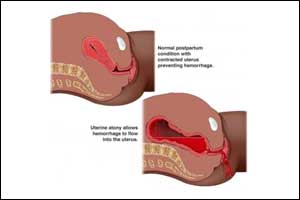- Home
- Editorial
- News
- Practice Guidelines
- Anesthesiology Guidelines
- Cancer Guidelines
- Cardiac Sciences Guidelines
- Critical Care Guidelines
- Dentistry Guidelines
- Dermatology Guidelines
- Diabetes and Endo Guidelines
- Diagnostics Guidelines
- ENT Guidelines
- Featured Practice Guidelines
- Gastroenterology Guidelines
- Geriatrics Guidelines
- Medicine Guidelines
- Nephrology Guidelines
- Neurosciences Guidelines
- Obs and Gynae Guidelines
- Ophthalmology Guidelines
- Orthopaedics Guidelines
- Paediatrics Guidelines
- Psychiatry Guidelines
- Pulmonology Guidelines
- Radiology Guidelines
- Surgery Guidelines
- Urology Guidelines
Carboprost is better for postpartum haemorrhage prophylaxis

The most accepted definition of postpartum haemorrhage is any bleeding from or into the genital tract following delivery of the baby, excessive enough to alter the maternal haemodynamics.
- After delivery of the placenta a woman may lose up to 20% of her blood volume before clinical signs due to haemorrhage become evident; which means waiting for signs of excessive bleeding may delay timely initiation of appropriate treatment.
- Incidence of postpartum haemorrhage is approximately 2% of all women following child birth. It is associated with almost twenty five percent of all maternal deaths globally. It is also the leading cause of maternal mortality in most low-income countries.
- During the latter half of twentieth century, a new concept of “active management of the third stage of labour” was introduced, to prevent post-partum haemorrhage and administration of a uterotonic immediately after delivery of the anterior shoulder of the baby was the most important component of active management of third stage of labour.
- An interesting observation is that despite being a good uterotonic agent, WHO has not yet included carboprost in the list of drugs for active management of third stage of labour.
This study aims at comparing the effectiveness of two drugs available in the market in the prophylaxis of postpartum haemorrhage, i.e., carboprost and methylergometrine
Muralikrishnan Nambiar et al. in an observational study compared the effectiveness of two drugs available in the market in the prophylaxis of postpartum haemorrhage, i.e., carboprost and methylergometrine. All Pregnant ladies between 37 to 42 weeks of gestation having vaginal delivery at the study setting between September 2015- Sep 2016 were included in the study.
In the study involving 150 pregnant women who received either methylergometrine (250 mcg) or carboprost (125 mcg) following the delivery of anterior shoulder of the baby. Incidence of postpartum haemorrhage, median duration of third stage of labour, median post-partum blood loss, fall in haemoglobin and fall in hematocrit along with side effect profile of the drug were studied. χ 2 test and students unpaired t test were the test of statistical significance employed. Median duration of third stage of labour was 6.3 minutes in women who received Methylergometrine and 5.5 minutes in those who received carboprost.(p value.(p value <0.001). Median postpartum blood loss was 300 ml in patients who received methylergometrine and 150 ml in those who received carboprost.(p value ><0.001). Change in haemoglobin and PCV were 0.6 and 2.4 respectively in patients who received methylergometrine and 0.3 and 1.2 respectively in women who received carboprost (p value ><0.001).
Carboprost was superior to methylergometrine with respect to the above mentioned outcome measures with no significant difference in side effects; thus should be preferred to methylergometrine in active management of third stage of labour.
For more details click on the link :

Disclaimer: This site is primarily intended for healthcare professionals. Any content/information on this website does not replace the advice of medical and/or health professionals and should not be construed as medical/diagnostic advice/endorsement or prescription. Use of this site is subject to our terms of use, privacy policy, advertisement policy. © 2020 Minerva Medical Treatment Pvt Ltd